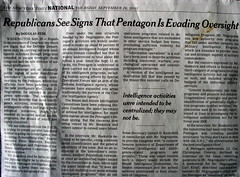Republicans See Signs That Pentagon Is Evading Oversight
By DOUGLAS JEHL
www.nytimes.com/2005/09/29/politics/29intel.html?ex=11287...
Published: September 29, 2005
Correction Appended
WASHINGTON, Sept. 28 - Republican members of Congress say there are signs that the Defense Department may be carrying out new intelligence activities through programs intended to escape oversight from Congress and the new director of national intelligence.
The warnings are an unusually public signal of some Republican lawmakers' concern about overreaching by the Pentagon, where top officials have been jockeying with the new intelligence chief, John D. Negroponte, for primacy in intelligence operations. The lawmakers said they believed that some intelligence activities, involving possible propaganda efforts and highly technological initiatives, might be masked as so-called special access programs, the details of which are highly classified.
"We see indications that the D.O.D. is trying to create parallel functions to what is going on in intelligence, but is calling it something else," Representative Peter Hoekstra, Republican of Michigan and chairman of the House Intelligence Committee, said in an interview.
Mr. Hoekstra said he believed that the purpose might be to obscure the extent of Pentagon intelligence activities and to keep them outside Mr. Negroponte's designated orbit.
Even under the new structure headed by Mr. Negroponte, the Pentagon's activities are widely understood to make up about 80 percent of an annual intelligence budget whose details remain classified but that is widely understood to total about $80 billion a year. Since the Sept. 11 attacks, the Pentagon is understood to have carried out a major expansion of its intelligence programs, including human spying efforts by Special Operations Forces and an arm of the Defense Intelligence Agency, whose missions have expanded into areas traditionally the purview of the Central Intelligence Agency.
The House and Senate Intelligence Committees have been pressing Stephen Cambone, the under secretary of defense for intelligence, for more information about the Pentagon's human spying. But the concerns now being voiced by Mr. Hoekstra and others appear to extend more broadly.
In the interview, Mr. Hoekstra declined to be specific, citing concerns about classification and the general sensitivity of the issue. But as an indication of the committee's sentiments, another Republican lawmaker cited an unclassified report issued by the committee in June, which said the panel believed that "it does not have full visibility over some defense intelligence programs" that do not clearly fall under particular budget categories.
The report said the committee believed that "individual services may have intelligence or intelligence-related programs such as science and technology projects or information operations programs related to defense intelligence that are embedded in other service budget line items, precluding sufficient visibility for program oversight."
"Information operations" is a military term used to describe activities including electronic warfare, psychological operations and counterpropaganda initiatives.
A version of the intelligence authorization bill that was passed by the House this summer calls on Defense Secretary Donald H. Rumsfeld, in consultation with Mr. Negroponte, to provide Congress with "a comprehensive inventory of Department of Defense intelligence and intelligence-related programs and projects." Those who would receive such a report would include the House Intelligence Committee, its Senate counterpart and the armed services committees in both chambers of Congress.
As part of the intelligence overhaul that Congress ordered last year, Mr. Negroponte, as director of national intelligence, is supposed to oversee 15 intelligence agencies whose activities fall under a budget category known as the National Intelligence Program. Mr. Negroponte has less authority over programs that fall under another category, the Military Intelligence Program, which are intended to provide tactical and strategic support to military commanders.
But the concern expressed by Mr. Hoekstra and others is focused on a third category of programs involving intelligence activity but not labeled as such, and included within the budgets of the individual military services.
"Greater transparency into these programs and projects will enhance Congressional oversight and permit identification of potentially duplicative programs in other services," the committee said in its recent report, issued in June to accompany the intelligence authorization act for the fiscal year 2006.
In the interview, Mr. Hoekstra said the committee had been told that the Pentagon was creating parallel structures "so they don't have to deal with the D.N.I.," the abbreviation for the new intelligence chief.
A Pentagon spokesman, Lt. Col. Christopher Conway, declined to comment on the issue, referring questions to Mr. Negroponte's office. A spokesman for Mr. Negroponte, Carl Kropf, described coordination between Mr. Negroponte's office and the Pentagon as "excellent" on budget issues.
"Successfully integrating D.O.D.-unique intelligence programs and missions into the National Intelligence Program requires full transparency," Mr. Kropf said. "Such transparency exists today."
Correction:
An article yesterday about concerns by Republican members of Congress that the Defense Department may be trying to avoid congressional oversight by using special intelligence programs misstated the amount of money the government is estimated to spend each year on all intelligence activities. The figure, which is classified, is believed to be about $40 billion, not $80 billion.
Thursday, October 13, 2005
Subscribe to:
Post Comments (Atom)


No comments:
Post a Comment